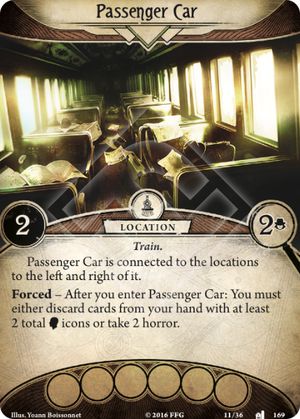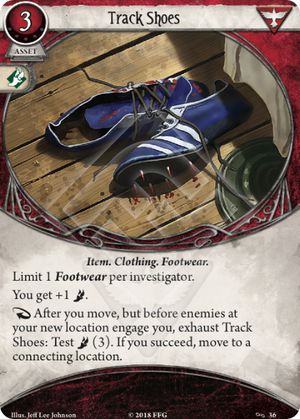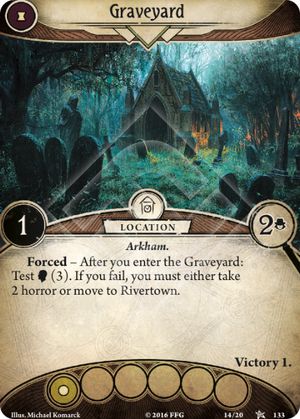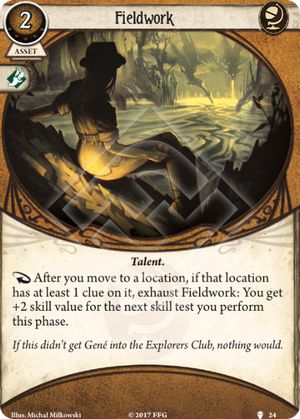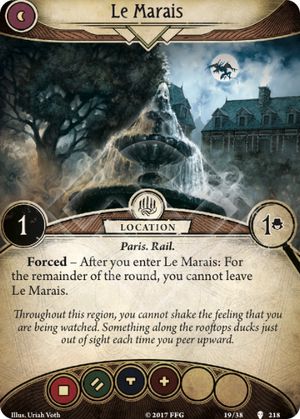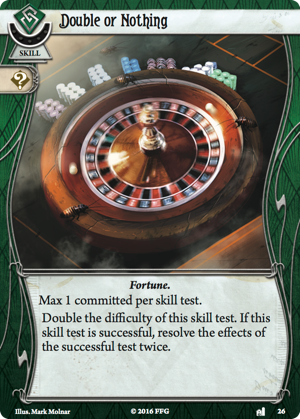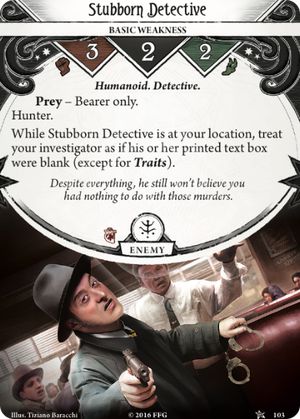
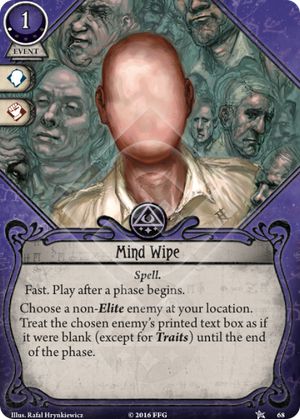
The same phrase can be a lot less clear when we are instructed to treat something "as if" it was true for a specific purpose only. It is easy to be unclear on where the specified purpose starts and ends. This is the central question behind the case of Sixth Sense.
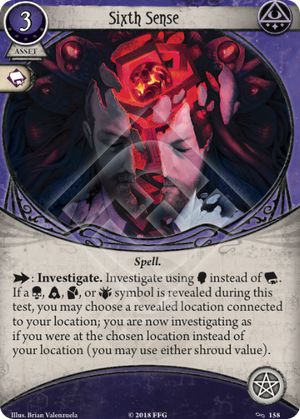
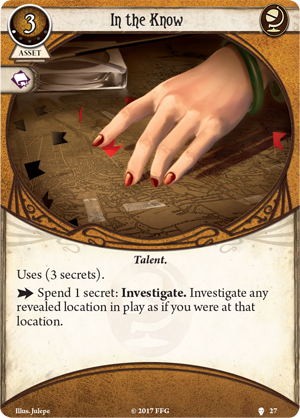
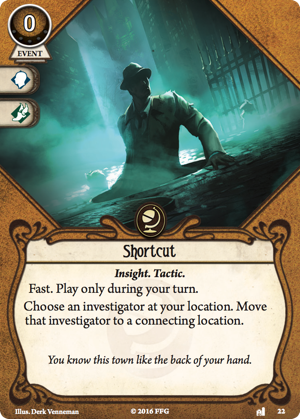

A few days ago, I posted the following image to the Arkham Horror: The Card Game community at large (link to large version).

The Question
When investigating "as if" one was at a location (by Sixth Sense's ability), for what purposes are one at that location?
Discussions
This question was discussed on the Arkham Horror LCG subreddit, the MythosBuster discord server, and the Arkham Horror: The Card Game Facebook group.
Interpretations
The following interpretations are not mutually exclusive:
The player is at the chosen location for the purpose of...
- Determining the difficulty of the investigation (if they so choose).
- Determining where the clue is discovered on success.
- Determining which cards can be committed.
- Resolving Chaos Token abilities.
- Initiating and resolving abilities triggered by events that are a part of the investigation.
- Everything, until the end of the investigation.
Investigation
There is a lot to unpack here. Let us start with the least controversial one:
The player is at the chosen location for the purpose of determining the difficulty of the investigation (if they so choose).
Since the card itself explicitly states that the player may use the shroud value of either location, we surmise that the player may use the shroud value of either location. However, it is unclear if the player would be able to use the chosen location's shroud if it was not explicitly permitted.
The player is at the chosen location for the purpose of determining where the clue is discovered on success.While it seems like the intention of Sixth Sense is to allow players to discover a clue at the chosen location, I take the unpopular stance that the player should not be able to as written. This is because all Sixth Sense's ability does is change your location for the purpose of the investigation. It does not change which location you are investigating. This is in contrast to In The Know, which indicates that you are actually investigating another location.


Changing your location during an investigation (for the purpose of the investigation only or otherwise) is more akin to playing Shortcut in the middle of an investigation. To that matter, a query from a previous player yielded the following response:
By the same logic, I extrapolate that the 'target' of Sixth Sense's investigation is determined and locked at the very beginning of the test and therefore is not changed by the ability, which only changes a player's effective location for this investigation."You can play this card during a skill test. This will not interfere with the test in any way, the 'target' of a test is determined and locked at the very beginning of the test." - ArkhamDB FAQ
The player is at the chosen location for the purpose of determining which cards can be committed.It might seem weird that this is being discussed, since by the time Sixth Sense's ability triggers, the time for committing cards is long past. However, it is possible to construe an (incredibly twisted) situation where this interpretation creates a distinction. For instance, consider the scenario where Silas Marsh is playing The Labyrinths of Lunacy and is given Sixth Sense by Paradox Effect. He uses Sixth Sense to investigate his location (which does not have a clue), drawing a Skull that forces him to draw another Elder Sign token. He chooses a connecting location which has a clue for Sixth Sense's ability. Would he be able to use his Elder Sign ability to commit a copy of Inquiring Mind from his discard pile?

My interpretation is yes. Committing cards to a skill test is a part of the investigation attempt. Therefore, if a player is investigating as if they are at a location with a clue, they should be allowed to commit Inquiring Mind to that skill test. However, an equally valid argument can be made that Silas' Elder Sign ability is not a part of the investigation attempt, therefore he should not be allowed.
This has ramifications for In The Know as well. For instance, whether or not another investigator at the location targeted by In The Know can commit a card to the skill test. Those ramifications are better discussed in another article.
The player is at the chosen location for the purpose of resolving Chaos Token abilities.I admittedly have no idea whether or not this is true. Any interpretation of the above requires drawing a line on where the investigation ends and the rest of the game begins. An extremely conservative view might draw the line at "determining difficulty and discovering clue". However, determining the difficulty of the test is the first step of a skill test, and discovering the clue one of the last. If the first and last steps are treated as if the player is at the new location, is difficult to argue that the intervening steps (including the committing of cards and resolution of chaos token abilities) are not treated to be at the new location. For a concrete example of this, refer to the poll in the follow up section below.
The player is at the chosen location for the purpose of initiating and resolving abilities triggered by events that are a part of the investigation.Similar to the statement above it, the interpretation of this statement depends on where the investigation ends and the rest of the game begins. The difference is that this statement seems much less likely as it is a lot harder to justify that triggered abilities on cards completely unrelated to the investigation are a part of the investigation. However, if we take this to be false, we are once again faced with the unenviable task of drawing the aforementioned line. With nested sequences, drawing a line here can create weird situations where the player is treated to be at the chosen location, then not, then at the chosen location again. For a concrete example of this, again refer to the poll below.
The player is at the chosen location for the purpose of everything, until the end of the investigation.Finally, this statement serves as a counterpoint to the extremely broad view. Unfortunately, this also appears to be the only way to avoid an interpretation where a player can be treated as being at the chosen location during parts of the investigation and not during others. If the player is at the chosen location for all purposes, it means that the player engages enemies at the chosen location. It means the player may move from the chosen location. Indeed if the player is able to inject actions into the investigation, it means that they may do battle against enemies at the chosen location - all the while still remaining at their current location. It is my opinion that this cannot be true, yet it is difficult for me to decide where the line must be drawn before this.
Limitations
The foremost limitation when it comes to interpreting Sixth Sense's ability is the lack of precedence or relevant FAQ/rules entries. It is difficult to surmise the intention when there are no other cards that do the same thing to point to.
Additionally, many interactions are not covered here. For example, if you choose Serpent's Haven for Sixth Sense's ability, would you take a damage if you are poisoned? What about Orne Library, would you spend an additional action? Does it matter which shroud you choose for the above cases?
Finally, conducting a poll for this was difficult. In the end, I concocted a contrived scenario that covered most but not all of the interpretations discussed above and questioned the outcome. Even then, the poll was not conducted well - the discussions surrounding the poll indicated some major misunderstandings that will be noted below.
Follow up
The results from the Arkham Horror: The Card Game Facebook group and the Arkham Horror LCG subreddit can be found here. The results from the MythosBusters discord server here. The results are congregated below, with a mental note to conduct a single poll for all three sources in the future.
At the time of writing, "1, She can investigate Cellar against a difficulty of 1 and pick up a clue there" had 63 votes for and 4 votes against.
- This is perhaps unsurprising, despite my personal interpretation to the contrary discussed above. It appears to be the intended way to use Sixth Sense.
At the time of writing, "3, She can investigate Hallway against a difficulty of 1 and pick up a clue there" had 45 votes for and 12 votes against.
- This statement was likely unclear. It seemed that many members of the community interpreted this to mean that Agnes does not have to choose to use Sixth Sense's ability. The question was intended to ask whether or not Agnes can investigate the Hallway despite having already chosen Cellar for Sixth Sense's ability. Perhaps a better way to ask this is whether or not Agnes would be able to use Sixth Sense in the Cellar, choose Hallway, then discover a clue in the Cellar with Hallway's shroud.
At the time of writing, with regards to the question of "Would Agnes take damage and horror from the tablet token" had 39 votes for she would not, 12 votes for she would, and 7 votes for she may choose whether or not she takes the damage and horror.
- At least some who responded "She may choose..." likely meant that Agnes may choose not to take the damage and horror if she does not choose Cellar for Sixth Sense, where the question is intended to ask about what would happen if she already chose the Cellar. Nevertheless, a sizable minority seems to consider the resolution of the Tablet token a part of the investigation.
At the time of writing, "8, Upon taking 1 damage and 1 horror from the Tablet token, she can use her reaction ability to deal the Ghoul Minion 1 damage." had 12 votes for.
- An option was not provided to the contrary. That was likely a mistake.
- This represents a majority of respondents who indicated that Agnes can at least choose to take the damage and horror. This result suggests that most who consider the resolution of the Tablet token a part of the investigation also consider any abilities triggered by Tablet token to be a part of the same.
Finally, at the time of writing "9, 'As if' is a clear way to represent Sixth Sense's ability" had 40 votes for and 24 votes against.
- This is the question I am most interested in - how many players think Sixth Sense's ability is communicated clearly. To that end, this question could be worded better. It is possible that some players found Sixth Sense's ability unclear, but did not think the phrase "as if" is responsible for it.
- While the majority of respondents found the phrase "as if" to be a clear way to represent Sixth Sense's ability, a large minority did not. It is my belief that rules text must be clear to at least 90% of the players and ideally more - a bar which Sixth Sense fails to meet.

